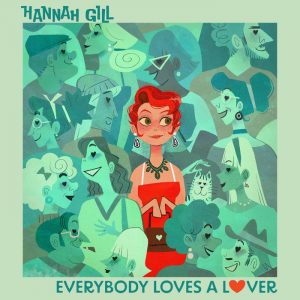CD Review: Hannah Gill’s “Everybody Loves a Lover”
Sometimes it’s a simple, refreshing delight when a singer records an album that is not out to re-invent the wheel but to honor the great legacy of American pop and the Swing era, embracing them with an emotional hug that allows listeners to luxuriate and lose themselves in the sweet journey that a well-crafted and curated time machine can offer. That is just what singer Hannah Gill has done with her new release, Everybody Loves a Lover. On it, the Golden Age of swing music, the 1920s to the 1950s, is brought back to life with a sound and a style as fresh as today, while honoring the sophisticated, band-singer era with respect and affection. It is a timeless musical paean to the songs and the singers that shaped American popular music for so long. In the 90’s there was a resurgence of interest in the music and dance bands of that bygone era, and it has remained a popular escape into the 21st century.
In addition to regular gigs around town with her group, Hannah Gill & the Hours, and performances with Brooklyn’s spectacular Company XIV, Gill is a member of Scott Bradlee’s Postmodern Jukebox whose mission is to reimagine pop songs as jazz tunes. She was signed to Turtle Bay Records by producer Scott Asen, who has assembled a stellar band to accomplish this magical bit of time travel and his pristine production matches the fantastic playing underscoring the singer’s flawless vocals. Bringing Danny Jonokuchi’s arrangements to pulsing, smile-inducing, toe-tapping life are a horn section made up of Jonokuchi on trumpet, Ryan Weisheit on sax and clarinet, Sam Chess on trombone, along with Greg Ruggerio on guitar, and the trio of Ben Zweig on drums, Tal Ronen on bass, and Gordon Webster on piano. Webster is a veteran of New York’s jazz, cabaret and open mic scene but has moved on to a much-admired and loved spot on the swing dance/lindy hop circuit for many years as both an accomplished player/arranger and as a dancer himself. In the interest of full disclosure, I worked with Webster back in the day (most memorably on the all-star closing performance of the much-missed Danny’s Skylight Room) and he remains one of my favorite keyboard players. I was happily surprised to see his name on the credits for this album.
In keeping with the idea of transporting the listener to the past, and the past to the listener, Gill has conceived the album as a reflection of how records were programmed and recorded in the old days. The insert in the beautifully designed packaging adds a sub-title to the project—“Songs for Heartbreakers & Love Makers.” As if there were still two sides to an album, the first six tracks (Side A) account for the love makers; the final five (Side B) for the heartbreakers. It’s a charming and fun addition to an already wonderfully imagined project.
All these elements add to the success and are witness to the care and talent put into the recording, but it is Hannah Gill’s vocals that make it the knock-out that it is. Belying her young years, she has a rich, warm, mature sound that harkens back to the pop jazz stars that have come before, while retaining her own sure and smart phrasing. And, oh yes, she swings! There are direct callbacks to Blossom Dearie, Ella Fitzgerald, Doris Day, and Nat King Cole in the song choices, but Gill is really honoring all the great pop singers of that era while securing a place of her own in that pantheon with her personal interpretations. Her relaxed, involving delivery is a constant pleasure and her interplay with her musicians displays her innate musicality as well.
The opener, “Moonlight Savings Time” (Harry Richman, Irving Kahal, 1931) was a favorite of Blossom’s and is a captivating welcome to the polished, irresistible sound of the album. While listening to the instrumental introduction, you might well imagine a tuxedoed man holding a baton and bouncing on the bandstand as he conducts the orchestra. “You Were Only Fooling” (Larry Fotine, Ben Gordon, Bill Faber, 1948, and recorded in that year by both Kay Starr and the Ink Spots) driven by Webster on the keys and punctuated by the magical horn solos, is a bittersweet declaration of love to an unimpressed object of affection.
Ella Fitzgerald not only sang “I Fell in Love with a Dream” but co-wrote it with Nate Goldsmith and Irving Skye in 1939 and it is resurrected here as one of the “finds” on the album. Ronen and Ruggerio on bass and guitar are perfectly paired with Gill’s touching confession; when the horns swell it’s all but impossible to not sway along. “You’re Getting to Be a Habit with Me” (Harry Warren, Al Dubin, 1932) was recorded in 1933 by Guy Lombardo with Bing Crosby and is resurrected here in a version that is much sunnier than most contemporary jazz singers treat it, and it works beautifully, especially with some tasty clarinet and trumpet adding buoyancy to Gill’s insistent vocals.
Doris Day gets a couple of welcome nods, first with “Put ‘Em in a Box” (Jule Styne, Sammy Cahn, 1948) that is a bouncy pleasure. It is followed by a raucous “Everybody Loves a Lover” (Richard Adler, Robert Allen) in blazing, New Orleans style with some percolating piano and drums, courtesy of Webster and Zweig, and some inspired overdubbing by Gill that is a time-capsule moment just where it’s needed. The mournful horns that introduce “Lullaby of the Leaves” (Bernice Petkere, Joe Young, 1932) lead straight into some of Gill’s darkest, jazziest moments in a haunting, bass-led nod to film noir that inspires Webster’s masterful piano solo and recalls in the best of ways, Ella Fitzgerald’s recording. “What Can I Say After I Say I’m Sorry” (Walter Donaldson, Abe Lyman, 1926) in both vocal and piano recalls the King Cole Trio’s 1946 recording while giving it a vital reading all its own. Five years earlier, the trio released “This Will Make You Laugh” (Irene Higginbotham, 1941) and in Gill’s terrific take, it is the other big find for me on the recording. She wrings every ounce of sadness and resignation out of the lyrics.
“Autumn Leaves” (Joseph Kosma, Jacques Prévert; English lyrics, Johnny Mercer, 1946) affords the band a most deserved spotlight with insistent swing and an inventive horn arrangement; against that fiery backdrop, Gill’s attack on the lyric is thrilling. A furiously paced “It’s a Sin to Tell a Lie” (Billy Mayhew, 1936, popularized by Fats Waller) is a rip-roaring finale, with the singer having great fun embracing the total abandon of her vocal. I just love this recording and although I have used the word once already, I have to say that it is “timeless”—it would have worked beautifully 60 years ago, it will work beautifully 60 years from now, and most importantly it works beautifully today. Hannah Gill is a great singer. Her conversational tone is wed to an unerring sense of time and swing, and her perfect phrasing to make Everybody Loves a Lover one of the musical treasures of 2023. I hope she books a live performance of it somewhere in town sometime soon. Until then, I will be listening to the album again, and again, and again and….
###
About the Author
Gerry Geddes has conceived and directed a number of musical revues—including the Bistro- and MAC Award-winning "Monday in the Dark with George" and "Put On Your Saturday Suit-Words & Music by Jimmy Webb"—and directed many cabaret artists, including André De Shields, Helen Baldassare, Darius de Haas, and drag artist Julia Van Cartier. He directs "The David Drumgold Variety Show," currently in residence at Manhattan Movement & Arts Center, and has produced a number of recordings, including two Bistro-winning CDs. He’s taught vocal performance at The New School, NYU, and London’s Goldsmith’s College and continues to conduct private workshops and master classes. As a writer and critic, he has covered New York’s performing arts scene for over 40 years in both local and national publications; his lyrics have been sung by several cabaret and recording artists. Gerry is an artist in residence at Pangea, and a regular contributor to the podcast “Troubadours & Raconteurs.” He just completed a memoir of his life in NYC called “Didn’t I Ever Tell You This?”






